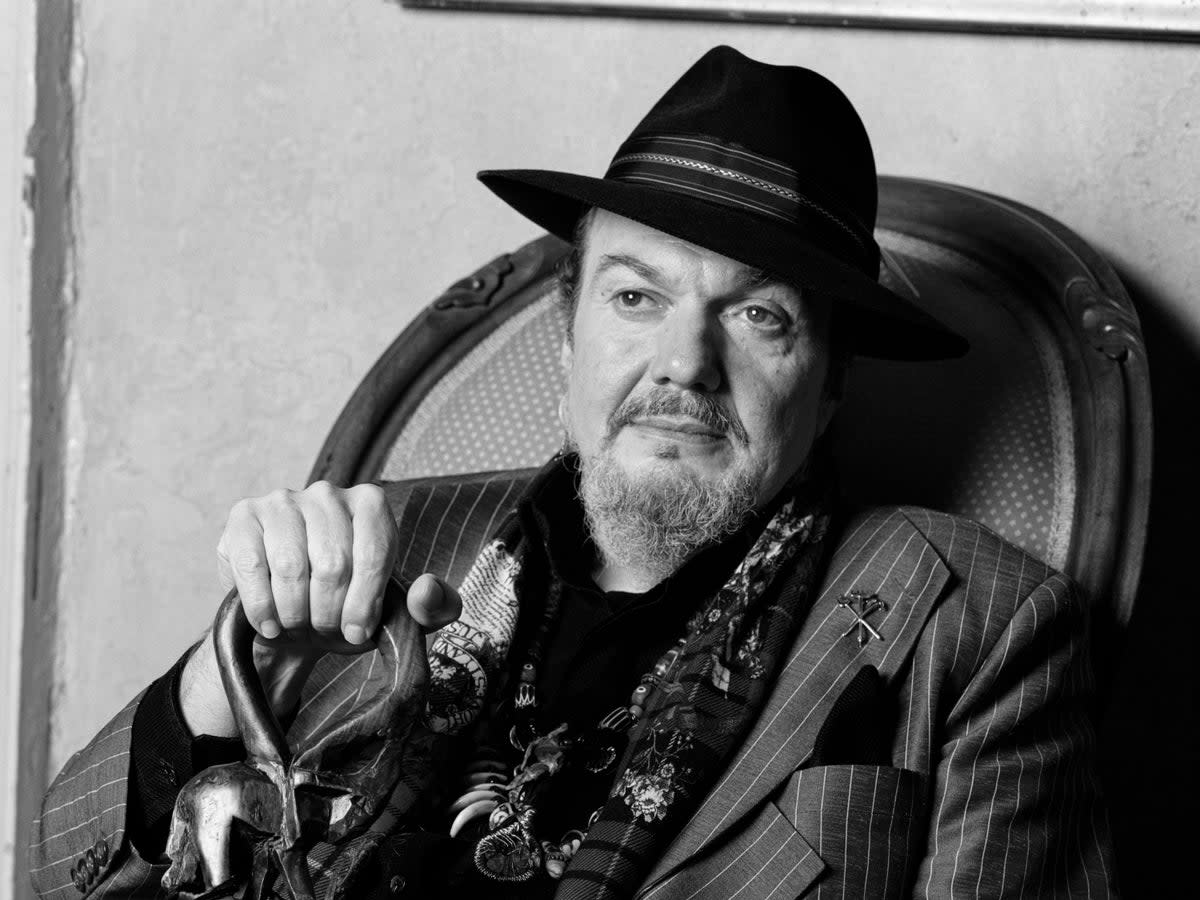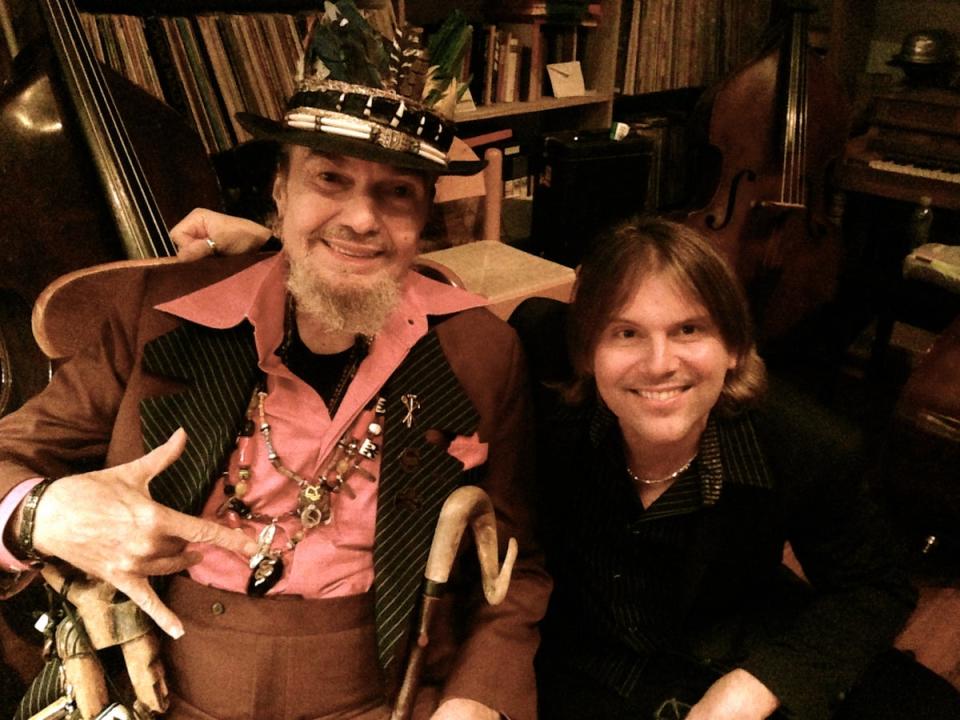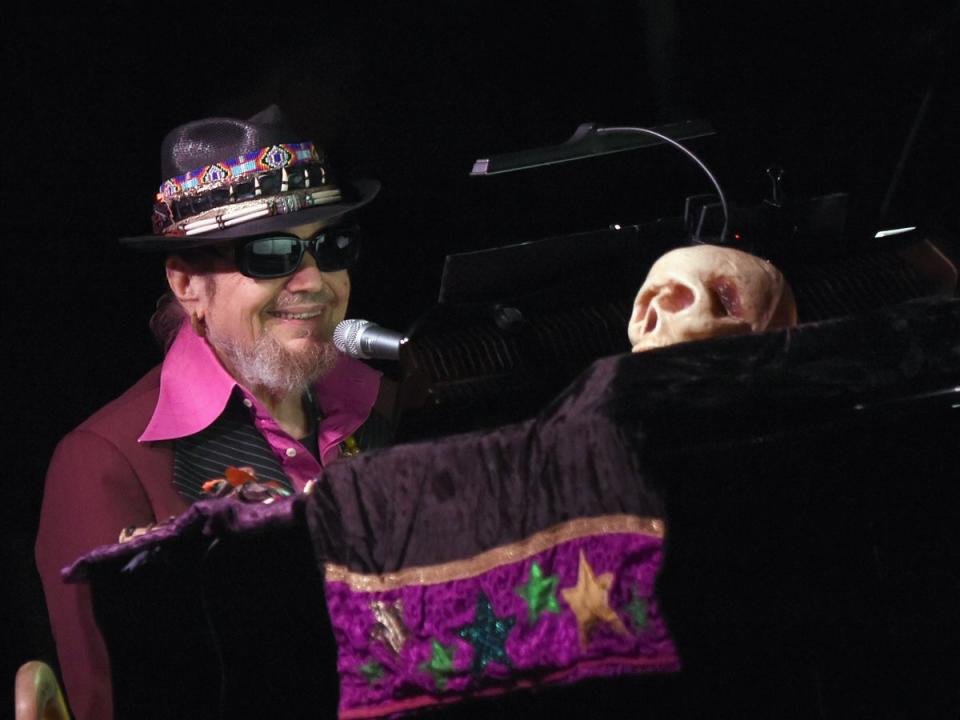The complicated story of Dr John’s ‘Things Happen That Way’, the album he always wanted to make

When Dr John first emerged in the late Sixties, it was as if a voodoo priest had risen up from the Louisiana swamps and immediately landed a record deal. It was an image the New Orleans-born singer-songwriter played up to, dressing like a medicine man in an elaborate feather headdress and performing with skulls and candles strewn around his piano. His real name was Mac Rebennack, and he was a 26-year-old session pianist for Sonny and Cher when he recorded his mind-bending 1968 debut album Gris-Gris, a bubbling gumbo of lysergic grooves, ritualistic percussion and growled incantations.
Rebennack embraced his shamanic character over the course of his half-century solo career, which took him to a host of unexpected places. He appeared alongside The Band during their farewell concert film The Last Waltz in 1976 and crooned the theme to Disney’s bayou-set The Princess and the Frog in 2009. Rich and intoxicating, his music was drenched in the many influences of his hometown, incorporating blues, jazz, funk and R&B. Towards the end of his life, though, he came to feel there was a piece of the puzzle missing. In the years before his death from a heart attack on 6 June 2019, at the age of 77, Rebennack set out to fulfil a lifelong dream by recording a country and western album. Titled Things Happen That Way, it will finally be released this Friday, following a long and troubled gestation period.
“He talked about it for years,” says Shane Theriot, a session guitarist and Grammy Award-winning producer who worked on the record. A fellow Louisiana native, Theriot – who is also the musical director for Hall & Oates – first met Rebennack in the 1990s. The producer was then in his twenties. “A lot of his friends that knew him way before I did said Mac always talked about making a country and western album,” he tells me over lunch in an LA diner. “He loved Hank Williams. He loved Johnny Cash.” After hearing Rebennack discuss this long-held ambition, Theriot volunteered to help turn it into a reality. In October 2017, the pair started meeting regularly at the producer’s New Orleans home to begin choosing covers and writing original material.

The process worked like a time machine for Rebennack, helping him travel back to his earliest influences and moments of musical discovery. In the Forties and Fifties, his father Malcolm ran an appliance shop in the East End of New Orleans, where he fixed televisions and radios as well as selling records.“That store was a large part of his musical origin story,” Rebennack’s daughter Karla Pratt tells me over email. “He grew up listening to all kinds of genres including what was then called ‘hillbilly music’. He loved Hank Williams for the stories in his songs. He also loved the sound of Johnny Cash, and Willie Nelson was not only a country music inspiration, but a longtime friend. Dad paid close attention to how these greats had created songs that resonated, and wanted to do that in his own style.”
As Rebennack sat on Theriot’s porch, smoking a cigar and listening to the music of his youth, he would be moved to reminisce about Saturday nights spent tuning into the popular country music show Louisiana Hayride. “He’d always have these great stories and anecdotes to go along with the songs,” recalls Theriot. “He’d say, ‘I remember seeing Elvis at Louisiana Hayride and I thought, This sucks! This guy ain’t goin’ nowhere. He don’t even have a drummer!’” Theriot laughs at the memory. “Then he’d go: ‘Shows you what I know!’” Rebennack’s inability to spot a rising star became a running joke between the pair. “He’d go, ‘I remember seeing John Lemon with The Beatles.’ He called him Lemon,” says Theriot. “‘I was thinking: Their songs are terrible! They ain’t goin’ nowhere. Shows you what I know!’”
Over the course of a month, the pair settled on which songs should be included on Things Happen That Way. Some were simply favourites of Rebennack’s, such as the traditional gospel staple “Old Time Religion” or Hank Williams’ “I’m So Lonesome I Could Cry”. Others, like a cover of the Traveling Wilburys’ “End of the Line”, were suggested by Theriot. For the opening track, they settled on a slow-boiled cover of Willie Nelson’s “Funny How Time Slips Away”.
It’s about the raw life he lived, and his beautiful take on it
Producer Shane Theriot
Like many songs on the album, including the title track – first made famous by Johnny Cash in 1958 – “Funny How Time Slips Away” is a song about the passage of time. Although Rebennack didn’t know Things Happen That Way would be his final record, Theriot notes that the album certainly captures him in a reflective mood. “As the record took shape and Mac’s health started declining, it became weird how much of it was about time,” he says. Fittingly, Rebennack adopts a musical style that’s a world away from the black magic and incantations of his most famous material. “It’s not about the Night Tripper, he did all that,” says Theriot of Rebennack’s flamboyant alter-ego. “It’s about the raw life he lived, and his beautiful take on it.”
In November 2017, Rebennack and Theriot decamped from the front porch to New Orleans’ Esplanade Studios, a converted church that Theriot calls “the nicest studio in town”. They recorded the majority of the album over just four days of sessions in November and December, before Rebennack’s condition took a turn for the worse. “Mac’s health got really bad,” says Theriot. “So then the rest of the record was finished at his house.” The producer set up a mobile studio at Rebennack’s house in Mandeville, Louisiana, 30 miles north of New Orleans. “He was living in a ranch house in a regular suburban neighbourhood, it didn’t look anything fancy,” says Theriot. “Then you walk in and there’s candles and all kinds of voodoo everywhere, like a shrine, and you go, ‘Wow!’”

Before the record was completed, Theriot sought out guest appearances from a handful of key figures from Rebennack’s storied career. Aaron Neville of R&B group The Neville Brothers, who knew Rebennack since the pair were teenagers, sings on “End of the Line”. Rickie Lee Jones, who won a Grammy with Rebennack in 1990 for their duet “Makin’ Whoopee”, joined Rebennack for a reworked version of “I Walk on Guilded Splinters”, the seven-minute epic that closed his debut album. Willie Nelson, meanwhile, accompanies Rebannack for the joyful take on “Old Time Religion”. “They’re trading off like two old buddies, which they were,” says Theriot. Recording was completed by October 2018, and the following month the album was mixed in New York by producer John Leventhal.
Theriot believed the album was finished and ready for release, but after Rebennack died in June 2019, control of the record passed to his family estate through his daughter. Theriot says several changes have been made to the album in the years since he worked on it. Rickie Lee Jones’ contributions have been removed, for example, and a new version of “I Walk on Guilded Splinters” added. “It was very frustrating, I was hurt over it,” says Theriot. “I put it together with Mac, then when Mac was gone all of a sudden the estate came in and decided they wanted to change things. I don’t know why, and I was told not to have anything else to do with it.”
The version of “Guilded Splinters” that now appears on the album features Lukas Nelson and his band Promise of the Real. Rebennack’s daughter Pratt says she invited the band to appear on the album in accordance with her father’s wishes. “Dad’s musical projects always went through changes and this was no different,” she says. “This album was not mastered during his lifetime for the reason that dad wanted to add some finishing touches and add Lukas Nelson on it. He instructed me to help him to do that. My Dad told me what he wanted. After Dad passed away unexpectedly, I had to pick up the pieces. to be able to carry out my duty to my Dad, his Estate, and his fans.”
She adds that other changes were necessary because “there was massive additional work to be done and this album could not be released without necessary permissions and clearances, further complicated by the Covid pandemic”. Michael Perlstein, a lawyer for Rebennack’s estate, further notes that: “The Estate is sole owner of, and controls all rights to, the masters as Mac’s successor” and that “Karla, in consultation with Rounder Records, authorised changes to avoid disputes over rights”.
While it may have changed since Rebennack was last able to hear it, the record remains a remarkable and powerful final statement from a musician facing the end by going back to where he started. At times, it recalls Johnny Cash’s powerful late-career American Recordings. Pratt says she thinks the “album is a perfect final studio project to release”, noting the significance of hearing her father sing with his old friends Willie Nelson and Aaron Neville. “To be able to now have Willie’s son, Lukas Nelson and Promise Of The Real recording ‘I Walk On Guilded Splinters’ 50 years after Dad’s first album Gris-Gris was released is truly full circle,” she says. “You could never count Dad out, and you can always count on his music to bring you joy.”
As for Theriot, while the finished record may not be quite as he envisioned it he’s happy the music is finally making its way out into the world. “I think it’s a beautiful record,” he says. “Mac is a legend, man. How could you have a bad Dr John record?”
‘Things Happen That Way’ by Dr John is released on 23 September

 Yahoo News
Yahoo News 
